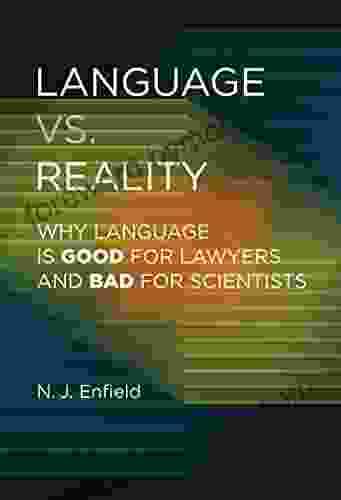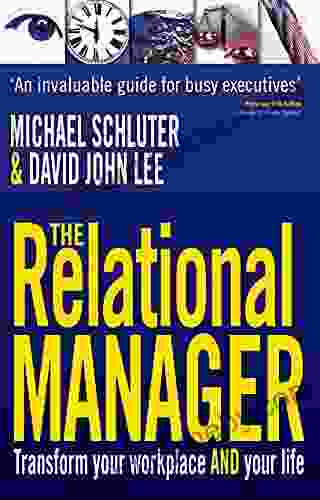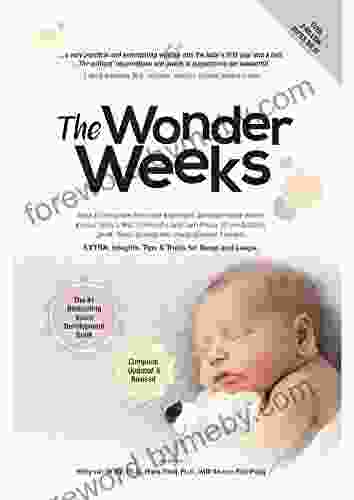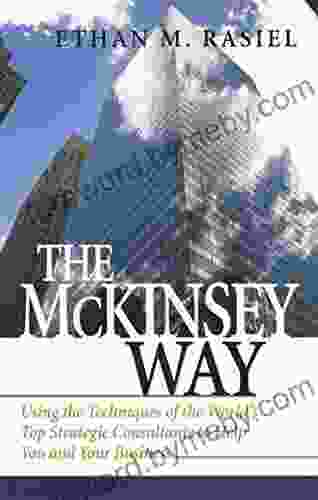Why Language Is Good For Lawyers And Bad For Scientists

Language is a powerful tool that can be used for good or for evil. In the hands of a skilled lawyer, language can be used to persuade, to deceive, and to win cases. In the hands of a scientist, language can be used to communicate complex ideas, to share knowledge, and to advance our understanding of the world.
5 out of 5
| Language | : | English |
| File size | : | 3960 KB |
| Text-to-Speech | : | Enabled |
| Screen Reader | : | Supported |
| Enhanced typesetting | : | Enabled |
| Word Wise | : | Enabled |
| Print length | : | 288 pages |
But while language is essential for both lawyers and scientists, it can also be a source of frustration and misunderstanding. For lawyers, language can be a tool for manipulation. They can use it to twist the truth, to create ambiguity, and to confuse their opponents. For scientists, language can be a barrier to communication. They can struggle to find the right words to express their ideas, and they can be misunderstood by those who do not share their specialized knowledge.
So, what is the difference between the way that lawyers and scientists use language? And why is language good for lawyers and bad for scientists?
The Way That Lawyers Use Language
Lawyers are trained to use language in a precise and persuasive way. They know how to use words to create the desired effect, and they are skilled at using language to manipulate their audience.
For example, a lawyer might use the word "justice" to evoke a sense of fairness and righteousness in the minds of the jury. They might use the word "negligence" to make the defendant seem careless and irresponsible. And they might use the word "damages" to make the plaintiff seem like a victim who deserves compensation.
Lawyers are also skilled at using language to create ambiguity. They can use vague terms, such as "reasonable" or "fair", to give themselves room to maneuver. And they can use complex sentence structures to make it difficult for their opponents to follow their arguments.
The ability to use language in a precise and persuasive way is a valuable asset for a lawyer. It allows them to win cases and to get their clients the best possible outcome.
The Way That Scientists Use Language
Scientists use language in a very different way than lawyers do. They are concerned with accuracy and clarity, and they strive to use language in a way that is unambiguous and easy to understand.
For example, a scientist might use the word "hypothesis" to refer to a tentative explanation for a phenomenon. They might use the word "data" to refer to the evidence that supports or refutes a hypothesis. And they might use the word "theory" to refer to a well-supported explanation for a phenomenon.
Scientists also strive to use language in a way that is objective and unbiased. They avoid using emotional language or language that could be interpreted as being biased in favor of one side or the other.
The ability to use language in a clear and concise way is essential for a scientist. It allows them to communicate their ideas effectively and to advance our understanding of the world.
Why Is Language Good For Lawyers And Bad For Scientists?
So, why is language good for lawyers and bad for scientists? The answer lies in the different ways that lawyers and scientists use language.
For lawyers, language is a tool for persuasion. They use it to win cases and to get their clients the best possible outcome. For scientists, language is a tool for communication. They use it to share knowledge and to advance our understanding of the world.
But while language is essential for both lawyers and scientists, it can also be a source of frustration and misunderstanding. For lawyers, language can be a tool for manipulation. They can use it to twist the truth, to create ambiguity, and to confuse their opponents. For scientists, language can be a barrier to communication. They can struggle to find the right words to express their ideas, and they can be misunderstood by those who do not share their specialized knowledge.
Ultimately, the way that we use language is a reflection of our values and our goals. Lawyers use language to win cases. Scientists use language to share knowledge. And each group has its own unique set of challenges and frustrations when it comes to using language.
Language is a powerful tool that can be used for good or for evil. In the hands of a
5 out of 5
| Language | : | English |
| File size | : | 3960 KB |
| Text-to-Speech | : | Enabled |
| Screen Reader | : | Supported |
| Enhanced typesetting | : | Enabled |
| Word Wise | : | Enabled |
| Print length | : | 288 pages |
Do you want to contribute by writing guest posts on this blog?
Please contact us and send us a resume of previous articles that you have written.
 Book
Book Novel
Novel Page
Page Chapter
Chapter Text
Text Story
Story Genre
Genre Reader
Reader Library
Library Paperback
Paperback E-book
E-book Magazine
Magazine Newspaper
Newspaper Paragraph
Paragraph Sentence
Sentence Bookmark
Bookmark Shelf
Shelf Glossary
Glossary Bibliography
Bibliography Foreword
Foreword Preface
Preface Synopsis
Synopsis Annotation
Annotation Footnote
Footnote Manuscript
Manuscript Scroll
Scroll Codex
Codex Tome
Tome Bestseller
Bestseller Classics
Classics Library card
Library card Narrative
Narrative Biography
Biography Autobiography
Autobiography Memoir
Memoir Reference
Reference Encyclopedia
Encyclopedia Jeremy Bhandari
Jeremy Bhandari Eugene B Kogan
Eugene B Kogan Fred Anderson
Fred Anderson Felice Benuzzi
Felice Benuzzi Franz Kellermann
Franz Kellermann Sarah Grison
Sarah Grison Erica N Walker
Erica N Walker Nathalie Desiree
Nathalie Desiree Flavius Josephus
Flavius Josephus Frank J Lechner
Frank J Lechner Francesca Cartier Brickell
Francesca Cartier Brickell Eric Spitznagel
Eric Spitznagel Fred Fields
Fred Fields Francesca Simon
Francesca Simon Ruby Walker
Ruby Walker Florian Dedov
Florian Dedov S L Morgan
S L Morgan Rachel Vail
Rachel Vail Susan Arrington Madsen
Susan Arrington Madsen Fiaz Rafiq
Fiaz Rafiq
Light bulbAdvertise smarter! Our strategic ad space ensures maximum exposure. Reserve your spot today!
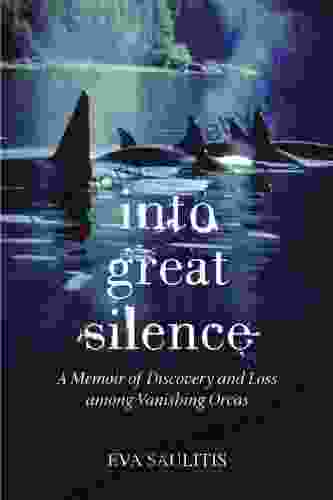
 Clarence BrooksUnveiling the Heartbreaking Yet Enchanting Memoir of Discovery and Loss Among...
Clarence BrooksUnveiling the Heartbreaking Yet Enchanting Memoir of Discovery and Loss Among... Jamie BellFollow ·8k
Jamie BellFollow ·8k Jessie CoxFollow ·6.1k
Jessie CoxFollow ·6.1k Isaac MitchellFollow ·9k
Isaac MitchellFollow ·9k Jan MitchellFollow ·8.3k
Jan MitchellFollow ·8.3k Donovan CarterFollow ·2.2k
Donovan CarterFollow ·2.2k Robert BrowningFollow ·6.5k
Robert BrowningFollow ·6.5k Joel MitchellFollow ·4.4k
Joel MitchellFollow ·4.4k Harry HayesFollow ·9.4k
Harry HayesFollow ·9.4k

 Al Foster
Al FosterDive into the Enchanting World of Manatees: An...
Unveiling the Secrets of the Gentle...

 Isaac Mitchell
Isaac MitchellThe Farm Reggie and Friends: US Version - A Captivating...
A Heartwarming Tale that Embraces...

 Esteban Cox
Esteban CoxThe Interior Design Handbook: Your Comprehensive Guide to...
Are you ready to...
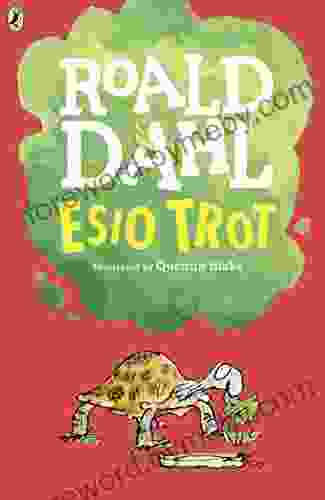
 William Wordsworth
William WordsworthFall Head Over Heels for "Esio Trot" by Roald Dahl: A...
Prepare to be charmed, amused, and utterly...

 Caleb Carter
Caleb CarterBlack Clover Vol Light Frida Ramstedt: A Thrilling...
Prepare to be spellbound by...
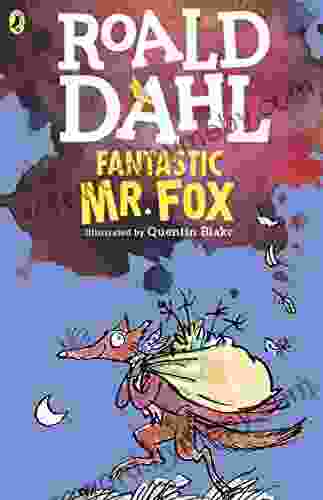
 Richard Simmons
Richard SimmonsFantastic Mr. Fox: A Literary Adventure That Captivates...
In the realm...
5 out of 5
| Language | : | English |
| File size | : | 3960 KB |
| Text-to-Speech | : | Enabled |
| Screen Reader | : | Supported |
| Enhanced typesetting | : | Enabled |
| Word Wise | : | Enabled |
| Print length | : | 288 pages |


